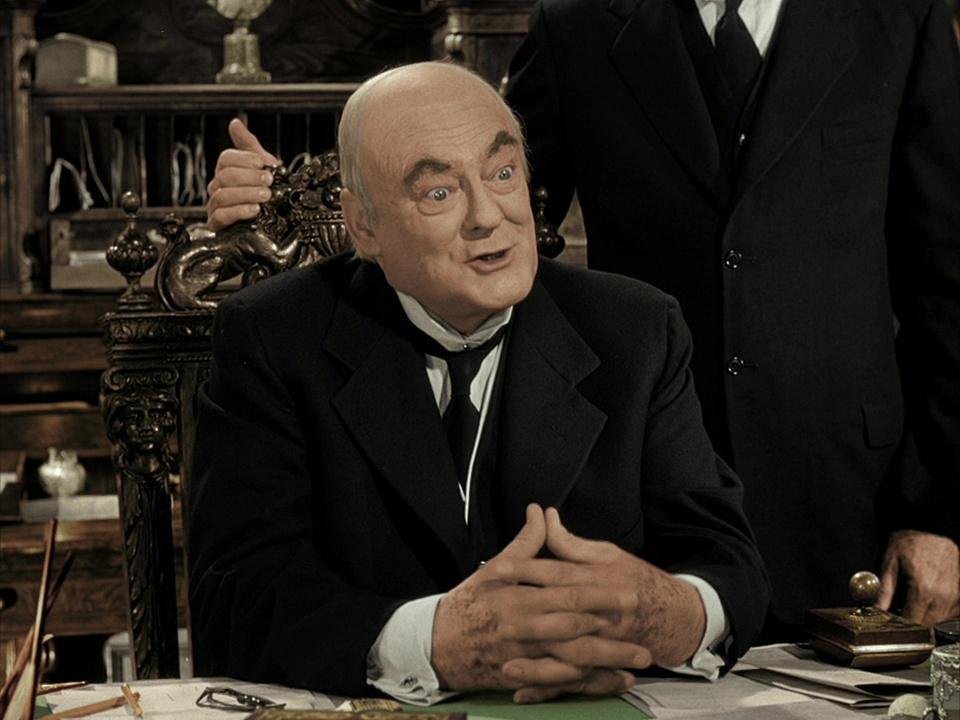1. “Charity is for dreamers; money is for realists.”
2. “Sentiment is the curse of those who can’t face hard facts.”
3. “Every dime owes me its allegiance.”
4. “Building and Loan? More like Building on False Hope.”
5. “The only thing that matches my ambition is my disdain for weakness.”
6. “Kindness is an expense I refuse to afford.”
7. “Why wish for wings when you can buy the sky?”
8. “Life rewards the cunning, not the kind-hearted.”
9. “The richest man in town is the one without burdens.”
10. “Goodwill is for the poor of mind.”
11. “I don’t need friends when I have power.”
12. “Every brick of Bedford Falls is a step toward my empire.”
13. “A man without wealth is a man without worth.”
14. “I’m not miserly; I’m monetarily prudent.”
15. “Success is the only holiday I celebrate.”
16. “Fortune rarely favors the sentimental.”
17. “Why hope when you can own?”
18. “I invest in certainties, not dreams.”
19. “Compassion is rarely worth the investment.”
20. “Debts are a handshake I never want to make.”
21. “Philanthropy is just a softer word for weakness.”
22. “A heart of gold is only useful if it’s made of actual gold.”
23. “My vault is my sanctuary.”
24. “I don’t ask for loyalty; I purchase it.”
25. “Optimism is for those who can’t afford reality.”
26. “The world is governed by those who understand its price.”
27. “Prosperity begins when generosity ends.”
28. “A handshake means nothing without a contract.”
29. “Kindness builds debts, not futures.”
30. “To conquer in finance is to conquer in life.”
31. “A dollar unearned is a dollar wasted.”
32. “Property is the only perennial asset.”
33. “I prefer investments to indulgences.”
34. “Desperation makes for the best interest rates.”
35. “Why dream when you can dominate?”
36. “I’m no Scrooge; I’m a realist.”
37. “The fruit of labor is ownership.”
38. “Every loan is an opportunity for influence.”
39. “I measure success by the silence of my creditors.”
40. “Security comes from control, not community.”
41. “In the end, even the strongest of spirits needs a roof.”
42. “I collect deeds, not dreams.”
43. “Charity spoils the value of hard lessons.”
44. “Ambition is my constant companion.”
45. “The weak call it greed, the wise call it growth.”
46. “Why wage a war of kindness when money wins all?”
47. “Emotion is a luxury I can’t afford.”
48. “Destiny favors those with a full ledger.”
49. “I see no profit in nostalgia.”
50. “I prefer dividends to delusions.”
Exploring the Enigmatic Character of Mr. Henry F. Potter in “It’s a Wonderful Life”: A Dive into Popular Fan Theories
In the beloved holiday classic “It’s a Wonderful Life,” Henry F. Potter stands as a symbol of greed and moral corruption, contrasting sharply with the film’s protagonist, George Bailey. Despite his ostensibly simple characterization as the film’s antagonist, fans of the movie have developed a plethora of intriguing theories about Mr. Potter that add layers to his personality and motivations. Let us explore some of the most captivating fan theories surrounding this enigmatic character.
The Theory of Potter as a Fallen Angel
One of the more mystical theories proposed by fans suggests that Mr. Potter is not just a man consumed by avarice but is in fact a fallen angel, similar to Clarence’s heavenly origins but from a darker lineage. This theory posits that Potter’s role is crucial in testing George Bailey’s resolve and goodness, thereby allowing viewers to witness the stark contrast between selfishness and selflessness. The notion of Potter as a fallen angel adds an ethereal depth to his character, suggesting that his purpose is not merely financial gain but to offer George a cosmic choice between paths of virtue and moral decay.
The Theory of Potter’s Hidden Backstory
Another popular theory delves into Mr. Potter’s past, speculating on the reasons behind his embittered outlook and malicious intent. This theory suggests that Potter might have suffered significant personal losses, which have hardened him and driven his obsession with controlling Bedford Falls. Such a backstory implies that Potter’s villainy is, in reality, a façade for his unresolved grief, offering a more empathetic perspective that mirrors George’s journey of overcoming personal struggles. The supposition that Potter once had a very different life adds narrative complexity and offers a sympathetic angle, urging viewers to reconsider the rigid dichotomy of good vs. evil.
The Theory of Potter as a Symbol of Corporate America
This interpretation presents Mr. Potter as a sophisticated allegory for unchecked corporate power in post-war America. According to this perspective, Potter embodies the adverse effects of capitalism and materialism, reflecting real societal issues faced during the film’s era. His relentless drive to monopolize Bedford Falls aligns with the anxieties surrounding economic disparities and the erosion of community values. As a stand-in for corporate greed, Potter’s character becomes a timeless commentary that resonates with modern audiences, reinforcing the film’s broader critique of losing sight of human connections in the pursuit of wealth.
While Mr. Henry F. Potter is undeniably portrayed as the antagonist of “It’s a Wonderful Life,” these fan theories highlight the complexity and richness that can be extracted from his character. Whether viewed as a metaphorical fallen angel, a product of a tragic past, or a symbol of corporate America, Potter serves to deepen the moral landscape of the film, encouraging audiences to reflect on broader themes of redemption, community, and the true essence of a fulfilling life.








